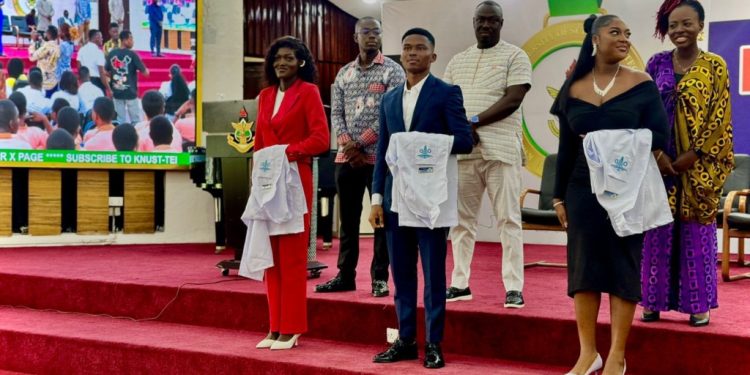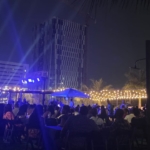Refractive error and vision care in Ghana is marred by low access, unaffordability, limited qualified personnel and weak government oversight.
The 8th White Coat Ceremony at KNUST’s Department of Optometry and Visual Sciences focused discussion on the urgent need to address refractive error setbacks in especially underserved Ghanaian communities.
The event marking students’ transition from pre-clinical studies to hands-on clinical training sought to overcome challenges to boost spectacle coverage and vision care access in low-income areas.

Refractive errors are common eye conditions that make vision blurry, needing a pair of glasses, contacts, or vision correction surgery to restore vision.
However, resources and structural setbacks limit treatments and access levels.
Head of the KNUST Department of Optometry and Visual Sciences, Professor Mohammed Kabir, disclosed that the burden of uncorrected refractive error tends to be greater in typically underserved areas.
“Despite the strides in vision care, several challenges of spectacle coverage in low- and middle-income countries exist. The burden of uncorrected refractive error tends to be greater in typically underserved areas. The concentration of services in urban areas, and a general lack of public awareness. The obvious challenges coupled with issues of clinical regulation need to be resolved to improve access and treatments,” he said.

The joint celebration of the 2025 Refractive Error Day and the 8th White Coat Ceremony by the Department of Optometry and Visual Science and the Ghana Optometric Association (GOA) sparked discussion around improving refractive error treatment.
Held under the theme “Bridging the Gap: Dispelling Refractive Error Myths to Improve Access,” the event highlighted national efforts to raise awareness, debunk misconceptions, and expand access to eye care services across Ghana.
The White Coat Ceremony is a traditional rite of passage in health-related fields, signifying the transition of students from pre-clinical studies to hands-on clinical training.
By training new up-to standard optometrists, the department aims to boost spectacle coverage and improve vision care access in low-income areas.
Head of the KNUST Department of Optometry and Visual Sciences, Professor Mohammed Kabir, admonished the graduates to uphold innovation, and ethics to improve vision care.
“The far-reaching consequences of uncorrected vision, particularly for children, impacts negatively on well-being and academic performance. We have a role in preparing students to handle real-world cases and interact with patients.
“This clinical phase of training equips the students with the skills to handle real-world optometric cases and begin interacting with patients in clinical settings, guided by well-defined professional standards and responsibilities,” he said.
The Optometry Class of 2027 were formally inducted into the clinical phase of their training with the symbolic donning of white coats.

The graduation ceremony also forms part of the Ghana Optometric Association’s Fractal Carousel Fusion.
President of the Ghana Optometric Association, Prof. Samuel Bert Boadi-Kusi, assuring of GOA’s commitment to address vision barriers, advocated for improved remuneration and working conditions for optometrists.
“There is a critical need for affordable eyeglasses and we call on the government to make them accessible to all citizens, particularly those in vulnerable communities. It is crucial for achieving the World Health Organization’s (WHO) target of improving effective refractive error coverage by 40 per cent by 2030.

“GOA remains committed through initiatives designed to improve access and quality of care. We call for improved remuneration and working conditions for optometrists, particularly those serving in rural areas, to enhance the reach of eye care services,” he said.
The ceremony brought together students, faculty, eye care professionals, and stakeholders in the health sector.
Chief Optometrist of Trust Hospital Accra, Dr. Naa Kowah, disclosed that visual impairment in the children demographic is prevalent due to uncorrected refractive errors.

“Over 200,000 Ghanaian children struggle with uncorrected refractive errors, making it the leading cause of visual impairment in this demographic. It is also important to dispel common misconceptions about eye health and the need to shift the perception of glasses as merely a luxury to recognizing them as essential tools for a better quality of life,” she said.
Chairman of the Education Committee of GOA, Professor Emmanuel Abu, admonished the graduating class to be innovative, and uphold the profession’s ethics.
“Take your journey from the classroom to the clinic, be transformed into trusted health professionals responsible for their patients’ vision. Your journey was marked by the values which must be embraced, and honored. Commit to unwavering adherence to the highest standards of ethics, professionalism, and empathy,” he said
DISCLAIMER: The Views, Comments, Opinions, Contributions and Statements made by Readers and Contributors on this platform do not necessarily represent the views or policy of Multimedia Group Limited.
DISCLAIMER: The Views, Comments, Opinions, Contributions and Statements made by Readers and Contributors on this platform do not necessarily represent the views or policy of Multimedia Group Limited.
- President Commissions 36.5 Million Dollars Hospital In The Tain District
- You Will Not Go Free For Killing An Hard Working MP – Akufo-Addo To MP’s Killer
- I Will Lead You To Victory – Ato Forson Assures NDC Supporters
Visit Our Social Media for More




